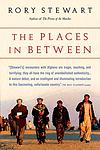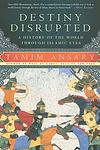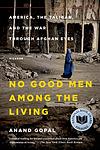The Greatest "Afghanistan, History" Books of All Time
Click to learn how this list is calculated.
This list represents a comprehensive and trusted collection of the greatest books. Developed through a specialized algorithm, it brings together 300 'best of' book lists to form a definitive guide to the world's most acclaimed books. For those interested in how these books are chosen, additional details can be found on the rankings page.
Genres
The category of "History" in books refers to the study and interpretation of past events, societies, and cultures. It encompasses a wide range of topics, including political, social, economic, and cultural developments, as well as the lives of individuals and groups who have shaped the course of history. History books can be written from various perspectives and may focus on specific time periods, regions, or themes. They aim to provide readers with a deeper understanding of the past and its impact on the present.
Countries
Date Range
Reading Statistics
Click the button below to see how many of these books you've read!
Download
If you're interested in downloading this list as a CSV file for use in a spreadsheet application, you can easily do so by clicking the button below. Please note that to ensure a manageable file size and faster download, the CSV will include details for only the first 500 books.
Download-
1. The Looming Tower by Lawrence Wright
"The Looming Tower" is a comprehensive historical examination of the events leading up to the 9/11 terrorist attacks on the United States. It delves into the origins of Al-Qaeda, the rise of Osama bin Laden, and the failure of U.S. intelligence agencies to prevent the attacks. The narrative is extensively researched and provides a detailed account of Islamic fundamentalism, the complex politics of the Middle East, and the role of the United States in the region. The book also explores the personal stories of key figures on both sides of the conflict.
-
2. The Forever War by Dexter Filkins
"The Forever War" is a non-fiction account of the conflicts in Afghanistan and Iraq from a journalist's perspective. The author, who was embedded with American troops, provides a raw and unfiltered look at the realities of war. The book gives a detailed description of the experiences of soldiers, civilians, and the author himself, offering a unique perspective on the ongoing conflicts. It explores the complexities and consequences of war, and the impact it has on those directly involved and the wider world.
-
3. The Places In Between by Rory Stewart
"The Places In Between" is a memoir by Rory Stewart about his journey on foot across Afghanistan in 2002, shortly after the fall of the Taliban. He travels from Herat to Kabul, encountering a variety of people and landscapes along the way. The book provides a unique insight into the culture and history of Afghanistan, as well as the challenges faced by the country in the aftermath of war. Stewart's writing is both lyrical and informative, making for a compelling read.
-
4. My Forbidden Face by Latifa
The book is a powerful autobiographical account of a young woman's life under the repressive Taliban regime in Afghanistan. It provides an intimate look at the brutal conditions women had to endure, including the denial of basic human rights, education, and healthcare. The author's courage and resilience shine through as she secretly documents the atrocities and injustices, providing a unique perspective on this dark period in Afghanistan's history.
-
5. The Warrior's Honor: Ethnic War and the Modern Conscience by Michael Ignatieff
The book explores the moral and ethical challenges faced by modern societies when confronted with ethnic conflicts and wars. It delves into the complexities of humanitarian intervention, the role of the media in shaping public perception, and the struggle to reconcile the principles of human rights with the brutal realities of ethnic violence. Through a series of case studies and philosophical reflections, the author examines the tension between the universal claims of morality and the particular loyalties of kinship and nationality, questioning the capacity of moral conscience to mediate in conflicts where deep-seated cultural and ethnic animosities are at play.
-
6. Destiny Disrupted by Tamim Ansary
The book provides a sweeping historical account of the world from the perspective of Islamic civilization. It spans from the time of the Prophet Muhammad to the early 21st century, offering insights into how Muslims have seen their history unfold, which is markedly different from the Western narrative. The author delves into the rise and fall of empires, the evolution of Islamic thought, and the complex interactions between the Muslim world and the West. This narrative aims to bridge cultural divides by presenting a story that is often left out of typical Western-centric historical accounts, thus giving readers a more nuanced understanding of global history and the roots of contemporary geopolitical issues.
-
7. Baburnama by Zahir Uddin Muhammad Babur
The book is a personal memoir and historical narrative written by a 16th-century Central Asian ruler who founded the Mughal Empire in South Asia. It vividly chronicles his life, including his struggles and conquests, as well as his observations on the diverse cultures, flora, and fauna of the regions he encountered during his reign. The text is notable for its candid and introspective style, providing a rare and valuable perspective on the period's political and social dynamics, as well as the personal thoughts and emotional life of a ruling monarch.
-
8. No Good Men Among The Living by Anand Gopal
The book provides a gripping and detailed account of the Afghan War through the eyes of three individuals: a Taliban commander, a warlord, and a housewife. By tracing their intertwined lives, the narrative reveals the profound misunderstandings and often tragic consequences of the U.S. involvement in Afghanistan. The author, through extensive on-the-ground reporting, uncovers how initial American successes were squandered, leading to the resurgence of the Taliban and a perpetuation of conflict. The work challenges the conventional narratives of the war and exposes the impact of foreign intervention on ordinary Afghan lives.
-
9. Directorate S: The C.I.A. and America's Secret Wars in Afghanistan and Pakistan by Steve Coll
This book provides an in-depth examination of the covert wars conducted by the CIA in Afghanistan and Pakistan, also known as "Directorate S." It offers an analysis of the complex relationships between the CIA, the military, and foreign governments, as well as the political and cultural challenges that shaped the war. The book also explores the consequences of these secret wars, including the rise of the Taliban and Al-Qaeda, and the impact on U.S. foreign policy.
-
10. Ghost Wars by Steve Coll
"Ghost Wars" is an in-depth exploration of the complex history of Afghanistan from the Soviet invasion in 1979 to just before the terrorist attacks of September 11, 2001. The book provides an intricate account of the CIA's role and America's foreign policy in Afghanistan, the rise of the Taliban, and the emergence of Osama Bin Laden. It also details the numerous missed opportunities to capture or kill Bin Laden, and the failure to prevent the 9/11 attacks.
Reading Statistics
Click the button below to see how many of these books you've read!
Download
If you're interested in downloading this list as a CSV file for use in a spreadsheet application, you can easily do so by clicking the button below. Please note that to ensure a manageable file size and faster download, the CSV will include details for only the first 500 books.
Download








